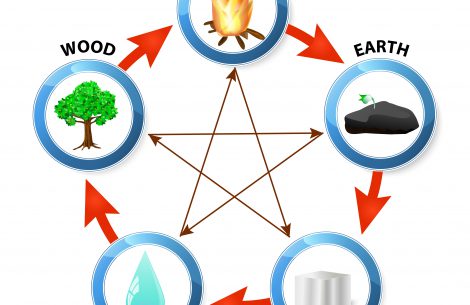Water is a necessity for life; without it, we can’t live. People in all cultures understand this. Water element characteristics in Traditional Chinese Medicine (TCM), however, takes on other significance: It’s one of the five elements in TCM, and it impacts the body in unique ways.
The archetypical energy of wood, fire, earth, metal, and water reflect in TCM the understanding of the laws of nature and how they interrelate with the body. The five elements along with other concepts help the TCM practitioner target the imbalances of the body, mind, emotions, and spirit. Each of the elements has characteristics that relate to a specific organ, emotional aspects, and how the organs function interactively.
Water Element Characteristics
Season – Winter represents water. Winter is the time to rest and employ restorative practices. How you maintain and build your energy in the winter influences the transition to spring. Physically, this can mean the difference between developing spring illnesses, such as allergies, or not. Also, the direction of north represents water.
Organs – The kidneys are associated with water. The essence (essential substances that makes up the human body and its functions) of the kidneys nourishes the bones through the marrow. The kidneys also sustain other parts of the body, such as the brain and spinal cord. The qi of the kidneys affects the auditory system. The kidneys are also interconnected to the uterus and influence reproduction and creativity.
Emotions – Balanced water energy allows a person to be adaptable to change and be able to sidestep difficulties just as water flows around and over obstacles in a river. Water also can be destructive. Imbalances can cause destruction and fear. Just like water can become frozen, fear can freeze a person from acting and create a sense of hopelessness.
Water and the Body
Water influences the body in more ways than just hydrating it; the amount of water affects the balance of fluids. Fluids need to be balanced to support blood, synovial fluid, and the lymphatic system. An imbalance of water causes the body to react. Dry hair, nails, throat, skin, and constipation can be signs of too little water.
You can also have too much moisture in the body. Too much dampness can cause symptoms of edema, yeast infections, fungus, oral thrush, and wet blistering rashes. Being overweight can also be a sign of too much water.
Triple Burner – In TCM, water is metabolized by a method referred to as Triple Burner. The system is like a double boiler used for cooking. The top is where moisture releases through your breath. In the middle is the digestive system where food converts into energy and nutrients. The bottom is where waste exits the body through the bladder and bowels.
Being in Water – It’s also important to immerse yourself in water through swimming and warm baths. Also, observing water in nature is considered helpful to feed the physical and spiritual self.
Traditional Chinese Medicine is a complex system, and this is just an overview of the importance of water in TCM – showing that water has a more involved function than just hydrating the body.
References:
- Five Major Organs. Retrieved from https://www.tcmworld.org/what-is-tcm/the-five-major-organ-systems/.
- Jaffee, Lynn. The Importance of Water in Chinese Medicine (May 04, 2015). Retrieved from http://acupuncturetwincities.com/2015/05/the-importance-of-water-in-chinese-medicine/.
- Kidneys. Retrieved from http://www.tcmbasics.com/zangfu_5zang_kidney.htm.
- Ling, M. Dr. What’s In A Pair? Yin & Yang in Chinese Medicine (January 06, 2013). Retrieved from https://drmeelainling.com/whats-in-a-pair-yin-yang-in-tcm/.
- The Elements. Retrieved from http://acupuncturist.edu/the-elements/.
- https://www.tcmworld.org/17337-2/.
- What’s the Big Deal About Water? Retrieved from http://oceanscape.aquarium.org/explore/general_articles/so-whats-the-big-deal-about-water

